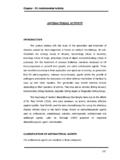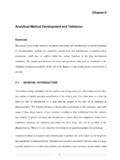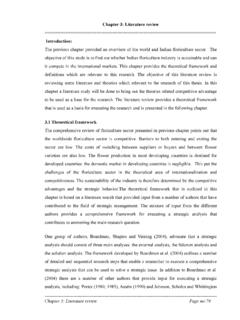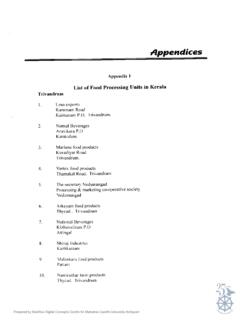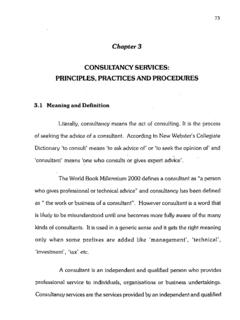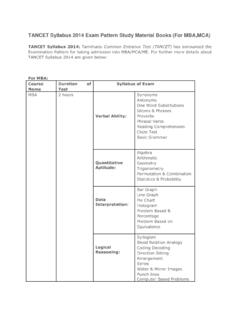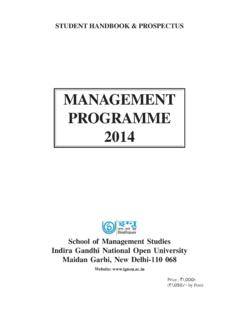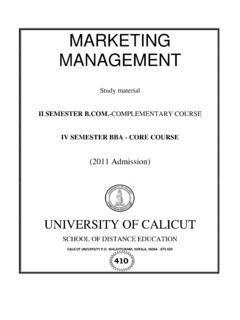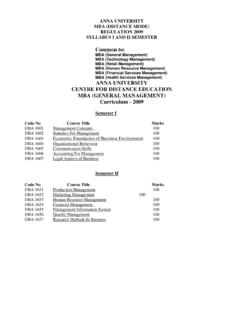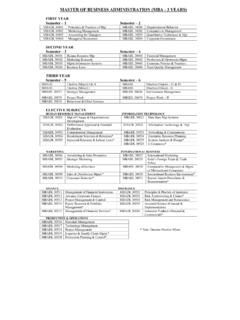Transcription of CHAPTER-2 INTRODUCTION TO MATERIALS MANAGEMENT
1 30 CHAPTER-2 INTRODUCTION TO MATERIALS MANAGEMENT MATERIALS constitute a major cost component for any Industry. The total cost of installed MATERIALS (or Value of MATERIALS ) may be 60% or more of the total cost (Stukhart 2007, Bernold and Treseler 1991), even though the factory cost may be a minor part of the total, probably less than 20-30%. This is because the manufactured item must be stored, transported, and restored before it is put in place or "consumed" at the site. The total cost of MATERIALS will include, in addition to the manufacturer selling cost, the cost of procurement (cost of placing processing and paying the material , physical distribution, the distributor's cost, and the transportation of MATERIALS ), and the site-handling costs (cost of receiving, storage, issuing, and disposal).
2 The efficient procurement and handling of material represent a key role in the successful completion of the work. It is important for the contractor to consider that there may be significant difference in the date that the material was requested or date when the purchase order was made and the time at which the material will be delivered. These delays can occur if the contractor needs a large quantity of material that the supplier is not able to produce at that time or by any other factors beyond his control. The contractor should always consider procurement of MATERIALS is a potential cause for delay (Willis, 2008). 31 Poor planning and control of MATERIALS , lack of MATERIALS when needed, poor identification of MATERIALS , re-handling and inadequate storage cause losses in labor productivity and overall delays that can indirectly increase total project costs.
3 Effective MANAGEMENT of MATERIALS can reduce these costs and contribute significantly to the success of the project. BACKGROUND The Webster's dictionary defines MATERIALS as "the elements, constituents, or substances of which something is composed or can be made." Ballot (2006) defines MATERIALS as the physical MATERIALS that are purchased and used to produce the final product and does not suggest that MATERIALS are the final product. In other words, MATERIALS are the parts used to produce the final product. Bailey et al. (2009) define MATERIALS as the goods purchased from sources out of the organization that are used to produce finished products. Stukhart (2007) defines MATERIALS as the items that are used to produce a product and which include raw MATERIALS , parts, supplies and equipment items.
4 Dobler and Burt (2009) classify manufacturing MATERIALS into five categories. These categories are: Raw MATERIALS - MATERIALS that the company converts into processed parts. This might include parts specifically produced for the company and parts bought directly off the shelf ( bolts, nuts). Purchased parts- parts that the company buys from outside sources ( rubber parts, plastic parts). Manufactured parts- parts built by the company ( tower case for a computer). 32 Work in process- these are semi-finished products found at various stages in the production process ( assembled motherboard). MRO supplies- maintenance, repairing, and operating supplies used in the manufacturing process but are not part of the final products ( soap, lubricating oil).
5 Chandler (2001) states that construction MATERIALS can be classified into different categories depending on their fabrication and in the way that they can be handled on site. He classifies the MATERIALS into five categories. These categories are Bulk MATERIALS - these are MATERIALS that are delivered in mass and are deposited in a container. Bagged MATERIALS - these are MATERIALS delivered in bags for ease of handling and controlled use. Palleted MATERIALS - these are bagged MATERIALS that are placed in pallets for delivery. Packaged MATERIALS - these are MATERIALS that are packaged together to prevent damage during transportation and deterioration when they are stored. Loose MATERIALS - these are MATERIALS that are partially fabricated and that should be handled individually.
6 Table presents some examples of commonly used MATERIALS in construction and their classification. 33 Table : Classification of MATERIALS (Adopted from Chandler, 2001) material Bulk Bagged Palleted Packaged Loose Sand X Gravel X Topsoil X Paving Slabs X Structural Timber X Cement X
7 X X Concrete X Pipes X X Tiles X Doors X Electrical Fittings X Stukhart (2007) states that the main categories of MATERIALS encountered in a construction project are engineered MATERIALS , bulk MATERIALS , and fabricated MATERIALS .
8 Bulk MATERIALS - these are MATERIALS manufactured to standards and are purchased in quantity. They are bought in standard length or lot quantities. Examples of such MATERIALS include pipes, wiring, and cables. They are more difficult to plan because of uncertainty in quantities needed. Engineered MATERIALS - these MATERIALS are specifically fabricated for a particular project or are manufactured to an industry specification in a shop away from the site. These MATERIALS are used for a particular purpose. This includes MATERIALS that require detailed engineering data. Fabricated MATERIALS - these are MATERIALS that are assembled together to form a finished part or a more complicated part. Examples of such MATERIALS include steel beams with holes and beam seats.
9 34 Importance of MATERIALS for a Project Problems related to managing the flow of MATERIALS can be found in every organization. The efficient MANAGEMENT of MATERIALS plays a key role in the successful completion of a project. The control of MATERIALS is a very important and vital subject for every company and should be handled effectively for the successful completion of a project. MATERIALS account for a big part of products and project costs. The cost represented by MATERIALS fluctuates and may comprise between 20-50% of the total project cost and sometimes more. Some studies concluded that MATERIALS account for around 50-60% of the project cost (Stukhart, 2007 and Bernold and Treseler, 1991). MATERIALS are critical in the operations in every industry since unavailability of MATERIALS can stop production.
10 In addition, unavailability of MATERIALS when needed can affect productivity, cause delays and possible suspension of activities until the required material is available. It is important for a company to consider that even for standard MATERIALS , there may be significant difference in the date that the material was requested or date when the purchase order was made, and the time in which the material will be delivered. These delays can occur if the quantities needed are large and the supplier is not able to produce those MATERIALS at that time or by any other factors beyond the control of the company. The company should always consider that purchase of MATERIALS is a potential cause for delay (Willis, 2008).
